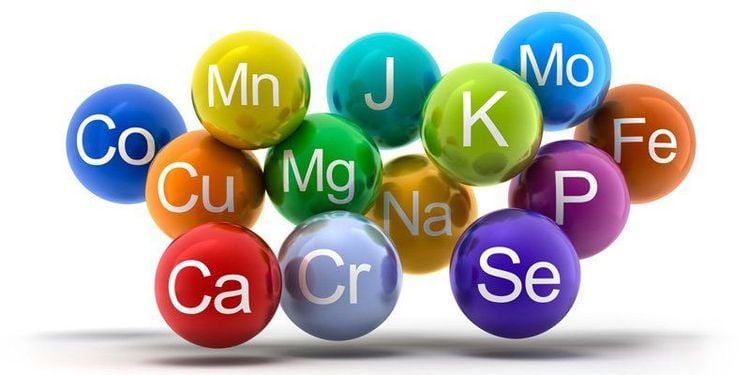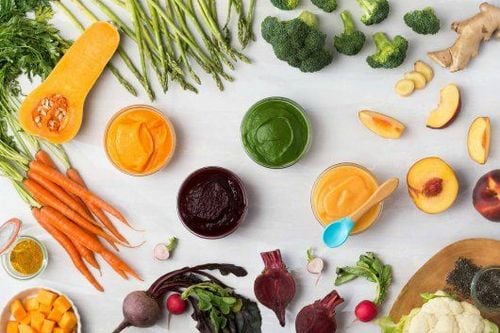This is an automatically translated article.
Nutritional needs of children from 1-3 years old play an important role in the health and development of children. Adequate and reasonable nutrition will help children develop less physically, intellectually and less likely to get sick. So what are the nutritional needs of children from 1-3 years old? Today's article will help you answer the above question.
1. What are the nutritional needs of children from 1-3 years old?
Nutritional needs for children from 1 to 3 years old play an important role in the health and development of children. Children who are not provided with adequate nutrition will lead to retardation of both physical and intellectual development, biochemical changes and disease consequences of nutrient deficiency.
1.1. The need for energy Children at this stage have had new development in the digestive system, the 1-year-old baby has grown some teeth and the ability to absorb nutrients has improved. Although the child's development rate has decreased compared to the period before 12 months of age, the activities have started to increase with the age of learning to talk, learn to walk... Therefore, the child's energy expenditure has also increased. .
The energy requirement of children from 1 to 3 years old is 1180 kcal per day (about 110 kcal/weight). Accordingly, the energy due to protein supplements per day is 2.5 - 3 g/kg of body weight and the amount of animal protein at the age should account for more than 50% of the total body protein. Lipids provide about 35-40% (about 70% are animal fats) of energy and glucid provides 45-50% of the body's energy needs. According to recommendations from nutritionists, the energy provided from foods should be calculated as 1 g of glucid and 1 g of protein for 4 kcal, 9 kcal in 1 g of lipid.
1.2. The need for vitamins Vitamins and minerals are essential nutrients in the development of children. At each stage of development, children's vitamin requirements are different.
Table 1. Daily vitamin needs for children from 1 to 3 years old
| Vitamin A | 400 µg | Vitamin B2 | 0,5 mg |
| Vitamin K | 13 µg | Vitamin B1 | 0,5 mg |
| Vitamin D | 5 µg | Vitamin PP | 6 mg |
| Vitamin B6 | 0,5 mg | Vitamin C | 30 mg |
1.3. The need for minerals Along with energy and vitamins, minerals including zinc, calcium, iron... also play an important role in the nutritional needs of children from 1-3 years old. Accordingly, the daily calcium requirement in children is about 600 mg/day, because they participate in the body's bone and tooth formation process. The amount of vitamin D also needs to ensure adequate supply to help the body absorb calcium better. For minerals, iron is a micronutrient that plays an important role in blood formation and participates in the composition of enzymes in the body. Therefore, parents need to pay attention to fully supplement iron needs at the child's developmental stage. Accordingly, the period of 1 - 3 years old children and above the need for iron for the body is about 7.7 mg per day.
Zinc mineral helps strengthen the body's immune system, plays an important role in the development and helps children eat well. Parents need to supplement their children's zinc needs depending on each stage of development. According to the recommendations of the World Health Organization (WHO), parents should supplement zinc for children 1-3 years old with a concentration of about 4.1 mg per day.

Nhu cầu dinh dưỡng của trẻ từ 1-3 tuổi về khoáng chất cần được đảm bảo
2. Develop a nutritional regimen for children from 1 to 3 years old
2.1. Nutrition for 1-year-old children Understanding the nutritional needs of 1-year-old children will help parents have the best child care regimen. According to nutrition experts, children at the age of 1 year should still be breastfed, until the age of 18-24 months, they can be weaned or longer. In addition, a complementary diet for children at this stage is indispensable and parents should ensure that the food composition is supplemented with nutrients including starch, fat, protein, vitamins and minerals. as follows:
Sugar powder: Cassava, rice, noodles, potatoes... Protein rich foods: Meat, shrimp, crab, fish, eggs... Vitamins, fiber: Fruits, vegetables, tubers... Lipids: Peanuts, sesame, animal fat, cooking oil, milk... Food used for baby's meals must ensure freshness, limit the use of ready-to-eat foods and each meal is processed safely. clean. For example, vegetables, meat, fish are always fresh, not rancid and do not contain harmful chemicals that affect the baby's health. The child's diet should be divided into 3 meals if the child is still breastfed and 5 meals (3 main meals and 2 snacks) if the child is no longer breastfed. The diet in the side meals can use easy-to-digest snacks such as cheese, fruit, especially yogurt to help supplement beneficial microorganisms for the digestive tract.
2.2. Building a nutritional regimen for children from 2 to 3 years old The nutritional needs of children aged 2 to 3 years old also need to be supplemented with adequate nutrients as at the age of 1 year old. However, at this age, children can already eat food with the family with 3 main meals of rice or porridge and 1-2 snacks in between which can be milk, cheese, fruit... At this age, milk supply is still very important. Accordingly, every day children should drink about 600-800 ml of milk.
Nutrition in children's daily diet is estimated at 100 - 140 g of rice or cereals, 80 - 120 g of eggs, fish, meat, tofu..., 20 ml of cooking oil, vegetables and fruits. and fruits according to the baby's needs with at least 100 - 200 g of green vegetables and 100 - 200 g of ripe fruits to help balance the energy needs and nutritional components for the development of the child.
Parents should build a care regimen that meets the nutritional needs of children 2 to 3 years old through the preparation of appropriate dishes and regularly changing the child's taste to help them eat more deliciously, prevent anorexia and fear of certain foods due to constant eating or overeating. For example, a mother can prepare a nutritious soup that combines a full range of foods to create an attractive color for the dish, nutrient groups such as shrimp-meat-egg soup, meat-pumpkin-green bean soup. ...

Nhu cầu dinh dưỡng của trẻ 2 tuổi đến 3 tuổi cần phù hợp với trẻ
At the stage when children have learned to eat soft rice, parents should cook the rice so that it is soft and finely chopped so that it is easy for the baby to eat. Nutrition in meals also needs to be full of nutrients such as meat, fish, soup and stir-fried dishes... Besides, parents should also build the habit of feeding their children on time, not eating candy and snacks. before the meal. Creating a happy atmosphere during meals will help children increase their interest and love for food and help them eat more deliciously.
Caring for children at the age of 1-3 years, meeting nutritional needs and having the right care regime, creating conditions for children to work with age-appropriate games will help children develop well. both mentally and physically.
Thus, to meet the nutritional needs of children from 1 to 3 years old in the most optimal way, parents should build a diet and exercise plan suitable for each stage of their baby's development.
Parents also need to note that the supplementation of nutrients, vitamins and minerals for children takes place for a long time, so it is recommended that parents be patient and calm when supplementing with substances for their children, either orally or through other methods. functional foods (TPCN). Especially when supplementing vitamins and minerals through dietary supplements, it is advisable to choose foods of natural origin for easy absorption, mothers should not use many types or continuously change the types of functional foods. give good results.
For more nutritional knowledge and child care for each age, parents should regularly visit the website vimec.com and make an appointment with the leading doctors, pediatric and nutrition experts of the National General Hospital. Vinmec when needing advice on children's health.













